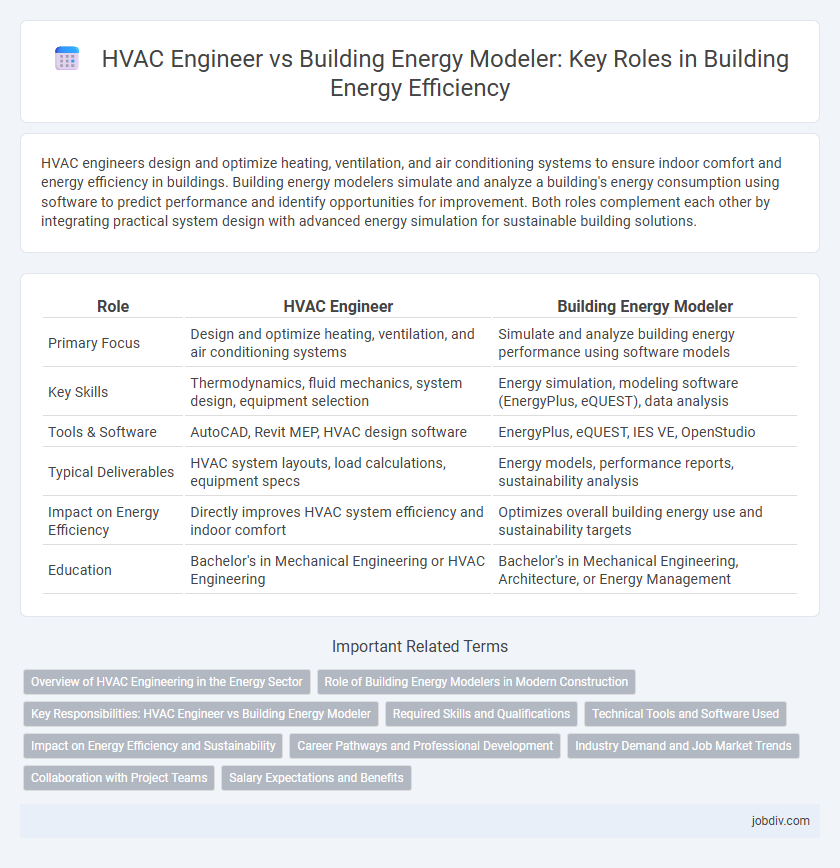HVAC engineers design and optimize heating, ventilation, and air conditioning systems to ensure indoor comfort and energy efficiency in buildings. Building energy modelers simulate and analyze a building's energy consumption using software to predict performance and identify opportunities for improvement. Both roles complement each other by integrating practical system design with advanced energy simulation for sustainable building solutions.
Table of Comparison
| Role | HVAC Engineer | Building Energy Modeler |
|---|---|---|
| Primary Focus | Design and optimize heating, ventilation, and air conditioning systems | Simulate and analyze building energy performance using software models |
| Key Skills | Thermodynamics, fluid mechanics, system design, equipment selection | Energy simulation, modeling software (EnergyPlus, eQUEST), data analysis |
| Tools & Software | AutoCAD, Revit MEP, HVAC design software | EnergyPlus, eQUEST, IES VE, OpenStudio |
| Typical Deliverables | HVAC system layouts, load calculations, equipment specs | Energy models, performance reports, sustainability analysis |
| Impact on Energy Efficiency | Directly improves HVAC system efficiency and indoor comfort | Optimizes overall building energy use and sustainability targets |
| Education | Bachelor's in Mechanical Engineering or HVAC Engineering | Bachelor's in Mechanical Engineering, Architecture, or Energy Management |
Overview of HVAC Engineering in the Energy Sector
HVAC engineering in the energy sector involves designing and optimizing heating, ventilation, and air conditioning systems to enhance energy efficiency and indoor air quality in buildings. HVAC engineers apply principles of thermodynamics, fluid mechanics, and control systems to develop sustainable solutions that reduce energy consumption and greenhouse gas emissions. Their expertise is critical for integrating renewable energy sources and meeting regulatory standards in commercial and residential building projects.
Role of Building Energy Modelers in Modern Construction
Building Energy Modelers play a critical role in modern construction by creating detailed simulations that predict a building's energy consumption, enabling designers to optimize HVAC systems for maximum efficiency and sustainability. Their expertise in energy analysis software helps reduce operational costs and minimize environmental impact through informed decision-making during the design phase. Collaboration with HVAC Engineers ensures that energy models align with mechanical system capabilities, resulting in buildings that meet stringent energy codes and green building certifications.
Key Responsibilities: HVAC Engineer vs Building Energy Modeler
HVAC Engineers specialize in designing, installing, and maintaining heating, ventilation, and air conditioning systems to ensure optimal indoor air quality and energy efficiency. Building Energy Modelers develop detailed simulations of building energy performance using software tools to analyze heating, cooling, lighting, and overall energy consumption. While HVAC Engineers focus on the mechanical system design and operation, Building Energy Modelers concentrate on predicting energy use and optimizing building-wide energy efficiency through data-driven modeling.
Required Skills and Qualifications
HVAC Engineers require expertise in thermodynamics, fluid mechanics, and HVAC system design, along with proficiency in software like AutoCAD and Revit for mechanical drafting and equipment selection. Building Energy Modelers need strong skills in energy simulation tools such as EnergyPlus, IES VE, or eQUEST, combined with knowledge of building physics, thermal comfort, and energy code compliance. Both roles demand a solid understanding of energy efficiency principles, but HVAC Engineers focus more on system mechanics while Energy Modelers emphasize predictive energy performance analysis.
Technical Tools and Software Used
HVAC Engineers primarily utilize design and simulation software such as AutoCAD, Revit MEP, and Trane TRACE 700 to create and analyze heating, ventilation, and air conditioning systems. Building Energy Modelers rely heavily on energy simulation tools like EnergyPlus, eQuest, and IES VE to evaluate building energy performance and optimize efficiency. Both professionals integrate advanced software to ensure sustainable and efficient building operation, but their focus differs with HVAC Engineers emphasizing system design and Building Energy Modelers concentrating on comprehensive energy analysis.
Impact on Energy Efficiency and Sustainability
HVAC Engineers optimize heating, ventilation, and air conditioning systems to reduce energy consumption and improve indoor environmental quality, directly enhancing building energy efficiency. Building Energy Modelers use simulation software to analyze whole-building energy performance, identify inefficiencies, and guide sustainable design strategies for long-term energy savings. Together, these roles drive improved energy efficiency and sustainability in building operations by integrating system-level optimization with data-driven energy modeling.
Career Pathways and Professional Development
HVAC engineers specialize in designing, installing, and maintaining heating, ventilation, and air conditioning systems, often progressing toward certifications like Certified HVAC Designer (CHD) or Professional Engineer (PE) licensure. Building energy modelers focus on simulating energy use in buildings to optimize efficiency and sustainability, frequently advancing through credentials such as Certified Energy Manager (CEM) or Building Energy Modeling Professional (BEMP). Both career paths offer growth opportunities in green building design, energy consultancy, and leadership roles within sustainable construction and energy management sectors.
Industry Demand and Job Market Trends
HVAC Engineers are in high demand due to increasing focus on energy-efficient heating, ventilation, and air conditioning systems across commercial and residential sectors, with job growth driven by green building initiatives and regulatory compliance. Building Energy Modelers are gaining traction as organizations prioritize predictive analytics for optimizing energy consumption and reducing carbon footprints, especially in sustainable architecture and urban planning industries. Both roles show robust job market trends, but HVAC Engineers typically dominate traditional construction and maintenance fields, while Building Energy Modelers excel in cutting-edge energy analysis and simulation roles.
Collaboration with Project Teams
HVAC engineers and building energy modelers collaborate closely to optimize system performance and energy efficiency in construction projects. HVAC engineers provide detailed mechanical design expertise, while energy modelers simulate building energy consumption to inform design decisions. Their combined efforts ensure integrated solutions that meet sustainability goals and regulatory requirements.
Salary Expectations and Benefits
HVAC engineers typically earn an average salary ranging from $70,000 to $110,000 annually, with benefits including health insurance, retirement plans, and performance bonuses. Building energy modelers command salaries between $65,000 and $95,000, often receiving benefits such as remote work opportunities, professional development stipends, and flexible schedules. Salary expectations vary based on experience, location, and industry demand, with HVAC engineers generally achieving higher earning potential in large-scale construction projects.
HVAC Engineer vs Building Energy Modeler Infographic

 jobdiv.com
jobdiv.com